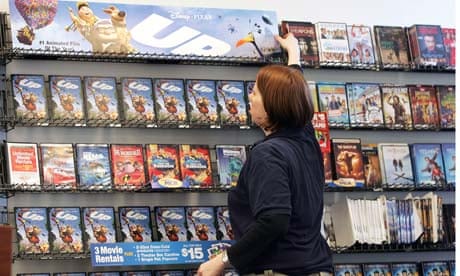It's been a huge source of Hollywood profit but the silvery, lucrative DVD could be consigned to the pages of a history book if plunging US sales continue for the rest of the year. Sales of new titles tumbled by nearly one fifth in the first three months of this year, a decline fuelled partly by a lack of hits and the timing of Easter – but also by the start of what appears to be an irreversible change in consumer habits.
The sale of DVDs has been falling since 2007, but the Digital Entertainment Group (DEG) reported that physical sales collapsed 19% to $2.2bn (£1.3bn) in the first quarter, while high-street rental also plunged by 36% to $440m, in a period when Blockbuster was in Chapter 11 bankruptcy protection. Online downloads and streaming through services such as Netflix, by contrast, grew quickly, although not enough to avert a 10% decline in the total home entertainment market to $4.2bn.
The industry was quick to offer its own excuses, focusing in particular on the late timing of Easter, and the relatively weak schedule of films. Warner Brothers chose to hold back on the release of Harry Potter and the Deathly Hallows Part 1 – an obvious industry banker – until April; a year ago saw the release of New Moon, the second in the Twilight series, or "franchise", which the industry hopes will replace Potter when the boy wizard series draws to a close one film from now.
Those factors led the DEG to point out DVD sales were bouncing back by 20% "in the first few weeks" of the second quarter, although that would still leave the market down overall in the year to date, even with the help of the nearly grown-up Harry. Nevertheless, the DEG said: "The industry has proven resilient, with modest gains posted in a number of key areas."
However, Hollywood is planning for the fact that the DVD market has long since peaked, with some analysts arguing that consumers no longer feel the need to buy films when they can rent them online. "Why buy movies any more?" asked BTIG analyst Richard Greenfield, in a research note on the state of the industry. "We believe consumers simply are not interested in owning content any more. Content is so easy to access on-demand, why buy it, especially given the dramatic price differential between buying and renting?"
The trends are broadly similar in the UK, and while the British Video Association, which tracks DVD sales in the UK, could not offer any data in 2010, a spokesman said that "we are seeing similar trends" with DVD falling and video on demand rising. "We are entering a period of change," the BVA said. "What we are seeing is growth in consumer choice, in terms of how people get their movies – with services like Lovefilm and Blinkbox coming through – but how that translates into revenue will depend on what agreements each distributor strikes."
Traditionally, Hollywood has relied on the notion that sales of DVDs represent the source of profit for a film, with the initial "theatrical" release the point where it is hoped a new movie breaks even. However, last year's Alice in Wonderland, which was directed by Tim Burton with a production budget estimated at about $250m, generated $334m at box office in the United States – and sold $75.3m worth of DVDs.
But despite the problems with physical product, it is far from clear that the film industry will follow the music business in a decline in physical sales that online innovations cannot repair.
Significantly, there are some signs that piracy is not lifting off, even as broadband internet access becomes more widespread in developed markets. Google, in a research paper published last month, said that searching for pirated movies, with terms such as "free movies" and "movie torrent" (reflecting the popularity of BitTorrent, a downloading protocol) peaked in 2008 – and has dropped since. Searching for legal DVD-related terms is also down about 45% in the same period but, according to Google's internal data, searching for online rental has lifted off.
The darling in the United States is Netflix, which was a DVD post-and-rental business that is gradually transitioning to streaming films on demand online in return for a monthly subscription – although there is a constant debate about exactly when and at what price films should be available. Nevertheless, the direction of the market is clear: Netflix has nearly 23m subscribers in the US, putting it on a par with Comcast, the largest cable company.
Meanwhile, the DEG noted that the subscription film business saw a 33% jump in revenue growth during the otherwise difficult first quarter to reach $695m – highlighting that the future for Hollywood is in the download, not the DVD.
